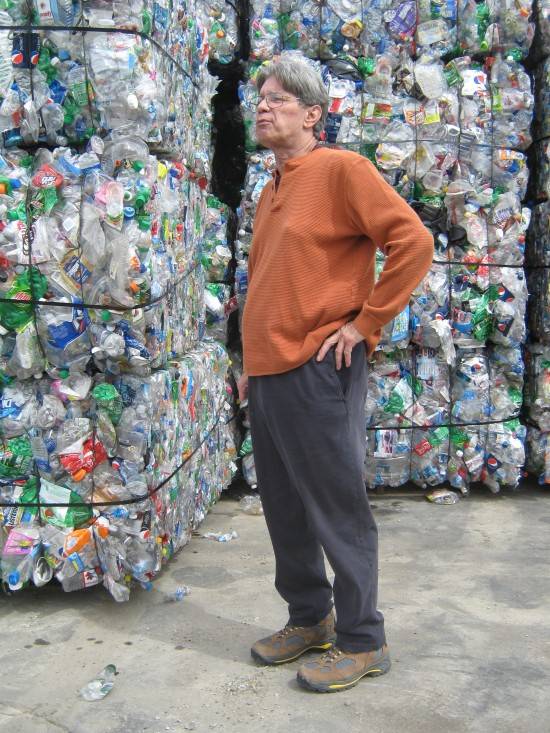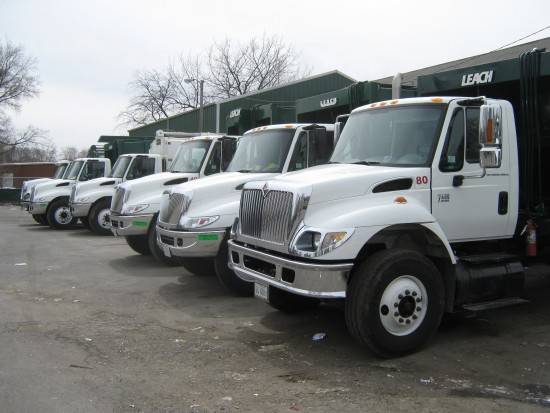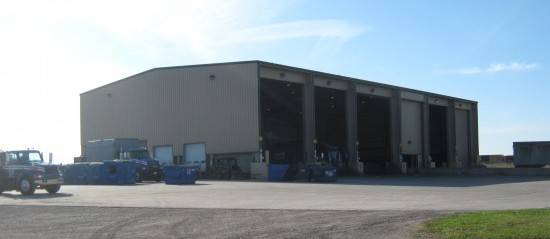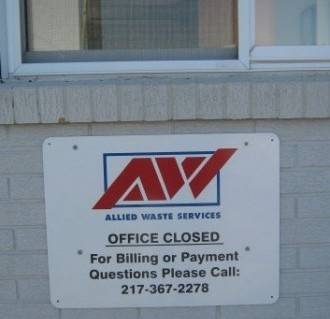One thing I’ve learned over the past months: there are no simple answers to questions about waste management and recycling in Champaign County. Ask any of the players a question and you only begin to poke at the surface; underneath are layers upon layers of eroded history, ragged remnants of conversations, un-enforced municipal codes, failed legislation, bruised memories and good intentions gone awry. Each explanation begs further explanation. I ask for clarification and come away with stories of profit schemes and well-connected millionaires, warnings about possible crime syndicates and even sad tales of love gone bad.
Why pursue the truth in such a quagmire? Well, for one, in spite of every area school child being taught to recycle as much as possible, there is the strong possibility that much of Champaign County’s recyclables are instead being buried in vast landfills. Of the big hauling companies, it appears that only one, ABC Sanitary Hauling of Champaign, recycles more than 4-5 items in any comprehensive way.

Steven Smith of ABC Sanitary Hauling Company in front of bales of plastic waiting to be shipped to a recycling facility. Family-operated ABC sorts and bales recyclables at their own facility on West Eureka Street in Champaign.
Certainly, a big part of the problem is that nobody wants to think about where recycling goes once it hits the curb. We get such a good feeling from doing something good for the environment…why ruin it? Champaign City Councilman Michael La Due agrees. “Anybody can talk the talk. ‘Recycling’ is a concept word like ‘Diversity’. It is a romantic notion.” That is, everyone agrees that is a good idea, and everyone champions the idea, but nobody really ever does anything to actually make it happen in a meaningful way.
And Michael La Due should know, as one of the longest-serving public servants in the county, he’s seen his share of disappointments and heartache in the not-quite-so-romantic real world of waste management policy-making. After years of attempting to establish inter-governmental cooperation in dealing with waste and landfill issues in Champaign County, La Due now takes what little victories he can get. Recently, the City of Champaign passed an ordinance that requires apartment buildings to provide recycling for residents, something that Urbana has already been doing for years. And he’s also pushing the need for a solid waste audit in the city, an initiative that seems to have council support, if only to begin to get a better picture of just what exactly gets picked up from our curbs and dumpsters and where it is all ending up.
Yet, in spite of these small victories, we are still left to wonder, as is every area resident who has watched as the garbage man chucks the contents of their recycle bin in with all the other garbage, if our recyclables are, in fact, being hauled out to landfills 30 or 40 miles away in Danville, Hoopeston or Clinton, and buried with common household trash.
Why would hauling companies do this? Well, there are many reasons, depending on who you ask. For example, according to Steven Smith, owner of the relatively small ABC Sanitary Hauling company, the larger hauling companies such as Allied Waste (now Republic Services) and Kleen-Way just aren’t willing to risk losing any amount of profit, so they dump recyclables, which may make up to 40% of their load, into the landfill. “It’s just easier for them to bury it,” he maintains. “Those big boys aren’t trying, really. It takes lots of up-front money to really recycle right.”
For Royal Coulter, CEO of Coulter Companies, the holding company of Peoria Disposal and the Clinton landfill, the volatile, and often unprofitable recyclables market is to blame. As he maintains in a 2001 interview, “One important factor in recycling is that it is more expensive than the public perceives. The markets need to improve and stabilize more for paper and corrugated cardboard.”
In a recent News-Gazette article, Cindy Eaglan of Illini Recycling agrees. “Multifamily recycling is a challenge for a business,” Eaglen said. “We have to make the other sectors of our business pay for residential (recycling). It’s very, very, very expensive.”
To complicate things, Coulter maintains that because leaders in the industry are having trouble making money they are closing recycling plants throughout the country. Competition forces companies to stop recycling programs unless the consumer is willing to pay for them. And yes, finding recycling plants that are still operating is a challenge, but not one that seems to discourage Mr. Smith at ABC.
Steve Smith maintains that his family-operated business still makes millions a year, much of which he reinvests in the business (especially in his late model fleet of trucks). He still somehow finds ways to ship all 24 items he recycles to Chicago, Indiana and elsewhere in order to find the recycling plants still in operation.

ABC’s newly purchased fleet of garbage trucks
Smith explains that the profits his company loses in recycling efforts are regained in securing contracts and larger chunks of the residential market. “I’m selling what the public wants. I’m not a tree-hugger. I’m a business man. I actually lose money on recycling, but I am making money overall because I really do, in fact, recycle. Folks know I’m not hauling it all away to a landfill.”
So just how would the average citizen really know what is happening to their recycling? Are we left to simply trust the claims of disposal companies? A representative of Arizona-based Republic Services (formerly Allied Waste), for example, claims that in Champaign County, their trucks pick up aluminum, steel, tin, plastic, glass and mixed paper (including cardboards) as well as household trash and transport everything to a transfer station on the north side of the city. The items that can be recycled then are sold to vendors and the household trash compacted and trucked to a landfill near Hoopeston, IL.
But at the transfer station off North Lincoln Avenue, things aren’t so clear. There, an Allied employee states that co-mingled recyclables are dumped in a special area and taken away “to a place not around here” where the items are sorted and then sold. When asked exactly where this sorting takes place, the employee, who claims to have been with Allied Waste (or earlier manifestations) for over twenty five years, tells me he is “not sure where it goes.”

The transfer station owned by Allied Waste (now Republic Services) off North Lincoln Avenue in Urbana. This station is open to the public for recycling, as well as to other hauling companies for waste transportation to landfills 30-40 miles away in Danville, Clinton or beyond.

When asked for someone who might have more information, the Allied employee directs me to the Allied Waste offices near Frasca Airport off Route 45. Once there, I encounter a locked door and a sign informing me that the office is no longer operational and offering a customer service number to call in case of questions (customer service for Allied Waste in our county is based in Morocco, Indiana). The employee back at the transfer station had given me a name, but besides a couple of truck drivers refueling their rig in the distance, there was nobody around to ask.
Allied Waste: nobody home
So while there is no concrete proof that hauling companies aren’t recycling (you would have to have access to the privately-held transfer stations and landfills), it remains plausible that recyclable items are often sold to vendors only when there is a market for such items. This is an especially sobering possibility when you consider that in the past year the market for recyclables has declined 50 percent from previous years. It just may be that there isn’t anywhere for those bales of plastic bottles to go, but in a landfill.
So why doesn’t federal, state or Champaign County government do more to oversee and encourage companies to make more efforts towards recycling? Why isn’t there more cooperation between municipalities in the area? Why are haulers shipping our garbage to other counties, contributing to road usage, equipment fatigue and gas consumption?
To answer these and many other lingering questions, you have to go back to the early 1990’s (and even earlier) and the failure of the Intergovernment Waste Management initiative in Champaign County, a failure that still irks public officials like councilman La Due.
Patsie Petrie, a professional city planner, writes in a local blog that “Once upon a time, Champaign-Urbana was considered the model community within the state and even nationally for recycling. It is a long story as to the demise of the recycling center and a very, very sad one.”
To be continued . . .
in
Part II: Tales of Woe in Waste Management








